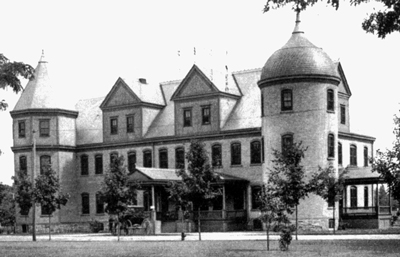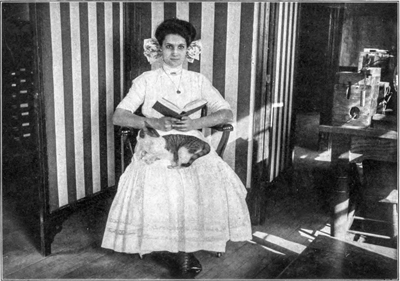Life imprisonment for ‘feeble-mindedness’?
The tragic story of Emma Wolverton

In the early 1900s, various ‘morality tales’ sought to advance the idea of eugenics. Squarely based on evolutionary belief in ‘survival of the fittest’, the eugenics movement was founded by Francis Galton, cousin to Charles Darwin1
This taught that, just as a farmer controls the breeding of his livestock to enhance the quality of his herd, promoting the childbearing of ‘ideal’ people and preventing ‘undesirable’ people from having children could improve the human race. One of the most popular pro-eugenics accounts was the story of ‘Deborah Kallikak’ (a pseudonym).
The story of the ‘Kallikak’ family supposedly went back to an ancestor code-named ‘Martin Kallikak’, who as a young man had a relationship with a “feebleminded barmaid” that resulted in the birth of Martin Jr. Later, Martin married a “worthy Puritan woman”, and their union produced many productive people. But alas, the damage had been done, because Martin Jr, a drunkard and worthless individual, had many children, and those children were all morally and intellectually bankrupt. Supposedly Deborah was a direct descendant of Martin Jr, and she was tested to be ‘feebleminded’, and was locked away in an asylum, supposedly to keep her from immorality.2

‘Deborah Kallikak’ was a pseudonym for the real woman Emma Wolverton. The problem is, the story was wrong from beginning to end. The genealogy was wrong for a start. ‘Martin’ and ‘Martin, Jr.’ were second cousins, not father and son, and were both the offspring of respectable married couples.3 And the testing used on Emma was invalid, as they didn’t take into account her complete lack of previous schooling when she first came to the asylum. Later evaluations also tended to downplay the significant gains that she made in learning practical skills. In fact, visitors to the asylum frequently expressed astonishment that such a ‘feebleminded’ woman could present herself so well. But unfortunately, no one ever doubted the story that Emma was feebleminded.

Emma entered Vineland Training School in Vineland, New Jersey at eight years old, and as a young woman was transferred to the women’s institution across the street. She was never offered the chance to have a life of her own—she was not offered freedom until she was far too old and ill to accept it. She died in 1978 at 89 years of age, having been a victim of a cruel branch of pseudoscience.4
Why does this matter?
Some might wonder why Emma Wolverton is important today. It is a sad story, but she died almost 40 years ago. Today, eugenics has a bad name because the Nazis used the ideology to support exterminating Jews and other ‘lesser’ races—after using it to justify murdering large numbers of mentally and physically handicapped people in the name of preventing them passing on their supposedly ‘inferior genes’.

But when Emma first entered the Vineland Training School, it was the scientific consensus in the western world, accepted by all preeminent researchers in the field, and approved by the US Supreme Court (Buck v. Bell, 1927). It seemed self-evident, enough to justify the lifetime incarceration of some ‘feeble-minded’ people, and the permanent sterilization of tens of thousands more.5 We look back in horror on the atrocities committed against people whose only ‘crime’ was being poor, uneducated, or otherwise disadvantaged, who were abused to advance a theory that built the careers of some of the most famous scientists of the day.
But it’s easy to forget that scientists still make pronouncements that affect the life and death of people today. Some ‘ethicists’ say that it is more merciful to kill a child in the womb when he or she may be born disabled, and that it is better to help a troubled or ill person to commit suicide rather than to ‘force’ him or her to live a life that they arbitrarily decide is ‘not worth living’. Someone as famous as Richard Dawkins proclaimed that the ‘moral’ thing was to abort a Down Syndrome baby and ‘try again’,6 and Peter Singer (Professor of Bioethics at Princeton University) infamously remarked that some animals have more moral value than some newborn babies.7
The only worldview that upholds the value of all human life, regardless of intelligence and ability, is the Christian worldview, because Scripture teaches that all human beings are created in the image of God and are thus inherently valuable, despite that image being marred by sin.
References and notes
- See Grigg, R., ‘Hooray for eugenics!’, Creation 30(3):50–52, 2008; creation.com/eugenics-church Return to text.
- ‘Deborah’s’ story was first told in Goddard, H., The Kallikak Family, New York, Macmillan and Company, 1912. Return to text.
- Smith, J.D. and Wehmeyer, M.L., Good Blood, Bad Blood: Science, Nature, and the Myth of the Kallikaks, pp. 200–201, Washington, D.C., AAIDD, 2012. Return to text.
- Emma’s real history is given in detail in Smith and Wehmeyer, ref. 3, and Smith and Wehmeyer, Who Was Deborah Kallikak? Intellectual and Developmental Disabilities 50(2):169–178 | doi:10.1352/1934-9556-50.2.169, April 2012. Return to text.
- Sarfati, J., America’s evolutionists: Hitler’s inspiration? Creation 27(2):49, 2005;creation.com/weak. Return to text.
- Cosner, L., Richard Dawkins: Dolphins worth more than babies with Down syndrome? creation.com/dawkins-ds-abortion, 24 August 2014. Return to text.
- .Cosner, L., Blurring the line between abortion and infanticide?creation.com/infanticide, 2 July 2008. Return to text.


Readers’ comments
Comments are automatically closed 14 days after publication.